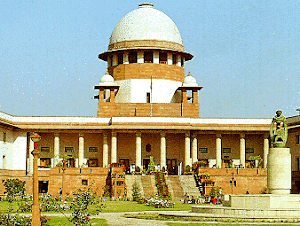Glare on asbestos risk U-turn |
| OUR SPECIAL CORRESPONDENT |
|
New Delhi, May 15: India’s
environment ministry has ignored domestic laws and reneged on its own
pledge by telling a global convention there is not enough evidence to
show that asbestos is hazardous to health, a non-government group said
today.
The group, called
Toxics Watch Alliance, has complained to the Centre that the ministry
delegation’s position at the UN’s Rotterdam Convention in Geneva earlier
this month was contrary to Indian laws and the ministry’s own earlier
decision.
Toxics Watch
Alliance said the ministry delegation had told the convention that
studies by Ahmedabad’s National Institute of Occupational Health (NIOH)
had shown no hazards from white chrysotile asbestos, widely used in the
construction industry to make asbestos-cement material.
The convention was
debating the need to include chrysotile asbestos into a special list of
hazardous substances that would make it obligatory for exporting
countries to alert importing countries about shipments.
In a letter to
Prime Minister Manmohan Singh, Toxics Watch Alliance has said it appears
(asbestos) industry representatives have “overwhelmed government
representatives who were made to take a position against human health
and the environment”.
The group has
cited several domestic laws that classify asbestos as a hazardous
substance. The ministry’s own vision statement says: “Alternatives to
asbestos may be used to the extent possible and use of asbestos may be
phased out.”
Toxics Watch
Alliance also cited a concept paper by the Union labour ministry
circulated at an India-European Union conference on occupational health
that said the Indian government was “considering a ban on the use of
chrysotile asbestos in India to protect the workers and general
population against primary and secondary exposure to chrysotile form of
asbestos”.
It said the
ministry stand this year was a “volte-face” over its support for the
listing of asbestos as a hazardous substance indicated by the
environment ministry’s own delegation at the previous Rotterdam
Convention meeting in 2011.
“In 2011, India
received a standing ovation for its support, we are saddened by what
happened this year,” said Gopal Krishna, a representative of Toxics
Watch Alliance in New Delhi.
The Union
environment secretary and the head of the environment ministry
delegation to the convention this year were not available for comment.
Another member of the delegation declined to provide any response.
Toxics Watch
Alliance has said documents it obtained through the Right to Information
Act have shown that the chrysotile asbestos industry had provided Rs 16
lakh to the NIOH study that cost about Rs 60 lakh.
The non-government
group said the documents also reveal that a review committee of the
NIOH study had said that the report of the findings would be “finalised
after due discussions with the asbestos industry”.
The International
Agency for Research on Cancer had said in 2009 that “there is sufficient
evidence in humans for the carcinogenicity of all forms of asbestos”.
|
Journal of Ban Asbestos Network of India (BANI). Asbestos Free India campaign of BANI is inspired by trade union movement and right to health campaign. BANI has been working since 2000. It works with peoples movements, doctors, researchers and activists besides trade unions, human rights, environmental, consumer and public health groups. BANI demands criminal liability for companies and medico-legal remedy for victims.
Thursday, May 16, 2013
Glare on asbestos risk U-turn: The Telegraph
Subscribe to:
Post Comments (Atom)
Blog Archive
- April (2)
- March (1)
- January (4)
- November (1)
- October (2)
- June (2)
- April (2)
- December (1)
- October (1)
- August (1)
- May (1)
- January (2)
- December (1)
- November (1)
- October (2)
- September (1)
- August (4)
- July (2)
- June (1)
- April (1)
- March (1)
- February (1)
- December (2)
- November (2)
- September (2)
- June (1)
- May (1)
- January (1)
- July (1)
- June (1)
- May (2)
- April (2)
- February (1)
- December (1)
- September (2)
- July (1)
- May (2)
- April (1)
- January (2)
- December (2)
- September (2)
- August (2)
- July (1)
- June (1)
- May (2)
- April (2)
- March (1)
- February (1)
- January (1)
- November (1)
- September (1)
- April (1)
- May (17)
- March (1)
- December (3)
- November (1)
- October (1)
- September (1)
- May (1)
- September (2)
- August (1)
- May (3)
- March (1)
- November (3)
- October (2)
- September (22)
- August (9)
- July (16)
- June (16)
- May (4)
- April (4)
- February (5)
- January (1)
- December (16)
- November (8)
- October (10)
- September (9)
- August (3)
- July (5)
- June (28)
- May (25)
- April (9)
- March (4)
- February (38)
- January (29)
- December (24)
- November (1)
- October (3)
- September (6)
- July (6)
- June (3)
- May (2)
- April (3)
- March (3)
- February (16)
- January (2)
- December (8)
- November (12)
- October (4)
- September (4)
- August (1)
- June (1)
- May (5)
- April (11)
- March (4)
- February (4)
- January (5)
- December (4)
- November (9)
- October (23)
- September (4)
- August (5)
- July (5)
- June (10)
- May (4)
- April (5)
- March (15)
- February (19)
- January (5)
- December (4)
- November (6)
- October (2)
- September (4)
- August (8)
- July (1)
- June (2)







No comments:
Post a Comment